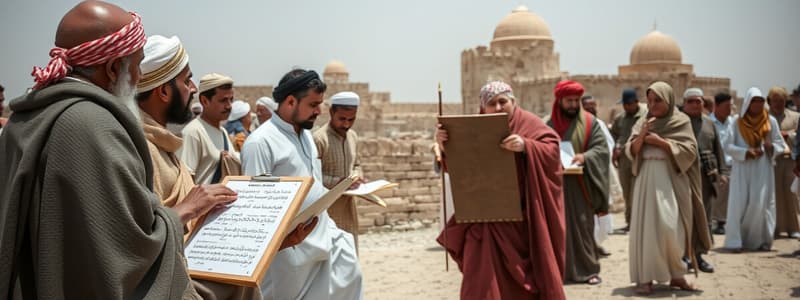Podcast
Questions and Answers
What contributions did Arabic science make to the field of medicine during the Middle Ages?
What contributions did Arabic science make to the field of medicine during the Middle Ages?
Why did Arabic science, despite its advancements, not lead to the emergence of modern science?
Why did Arabic science, despite its advancements, not lead to the emergence of modern science?
Which manuscript was a crucial part of the medical curriculum in European countries?
Which manuscript was a crucial part of the medical curriculum in European countries?
Which scientist is noted for frequently referencing Arabic medical writings in his work?
Which scientist is noted for frequently referencing Arabic medical writings in his work?
Signup and view all the answers
What motivated the scientific advancements in the Arab-Muslim world from the eighth to the fourteenth century?
What motivated the scientific advancements in the Arab-Muslim world from the eighth to the fourteenth century?
Signup and view all the answers
What were the significant contributions of Arabic-Islamic civilization to the development of modern science?
What were the significant contributions of Arabic-Islamic civilization to the development of modern science?
Signup and view all the answers
Which of the following best describes the impact of Greek scientific heritage on Western intellectual development?
Which of the following best describes the impact of Greek scientific heritage on Western intellectual development?
Signup and view all the answers
What role did the translation movement in the twelfth and thirteenth centuries play in the transmission of knowledge?
What role did the translation movement in the twelfth and thirteenth centuries play in the transmission of knowledge?
Signup and view all the answers
How did Arabic medicine and surgery differ from its predecessors?
How did Arabic medicine and surgery differ from its predecessors?
Signup and view all the answers
What was one of the notable intercivilizational encounters that influenced modern science?
What was one of the notable intercivilizational encounters that influenced modern science?
Signup and view all the answers
Study Notes
Greek and Arabic Scientific Heritage
- The Greek scientific legacy was largely inaccessible to the West from the fall of the Roman Empire until the translation movement of the 12th and 13th centuries.
- Arab scholars began translating significant works from Greek and other cultures into Arabic starting in the 8th century.
- The transmission of knowledge into Arabic-Islamic civilization was selective but included important aspects of Greek science and philosophy.
Contributions of Arabic-Islamic Civilization
- The Arabic adoption of the Hindu numeral system played a crucial role in mathematical development.
- Advancements in science made by Arabic-Islamic scholars were foundational for modern science, incorporating logical, mathematical, and methodological elements.
- The great translation effort facilitated the transfer of knowledge to the West, influencing Western intellectual development profoundly.
Intellectual Development and Integration
- Modern science emerged from intercivilizational dialogues among Arabs, Muslims, Christians, Greeks, and others.
- Greek traditions of rational dialogue and logical reasoning significantly influenced Western intellectual growth.
- Prominent Arab medical contributions included surgical advancements, especially noted in works like Al-Tasreef, which informed European medical education for centuries.
Decline of Arabic Science
- Despite significant scientific advancements from the 8th to the 14th centuries, the Arab-Muslim world began a period of decline and potential retrogression by the 12th century.
- The historical reasons behind the failure of Arabic science to evolve into modern science warrant thorough investigation and understanding.
Legacy and Exploration of Manuscripts
- Uncovered Arabic and Persian manuscripts hold valuable knowledge awaiting study and publication.
- Important historical figures, like Ibn Nafis, made groundbreaking discoveries that should be revisited.
Impact of Islamic Civilization
- The Islamic civilization (800-1600) thrived on invention, advancing architecture, mathematics, medicine, and astronomy.
- Contributions such as algebra and algorithms laid the groundwork for modern computing and data encryption.
- Cultural achievements included thousands of literary works highlighting themes of bravery, romance, and magic – countering fear of knowledge.
Interconnected Heritage
- The technological advancements and cultural contributions by the Islamic world have significantly shaped modern society.
- Influential civilizations like the Ottoman Empire, and centers of learning in Baghdad, Damascus, and Cairo, advanced both scientific and cultural domains, leaving a lasting legacy.
Studying That Suits You
Use AI to generate personalized quizzes and flashcards to suit your learning preferences.
Related Documents
Description
Explore the significant role of the Arab translation movement in preserving Greek scientific heritage during the Middle Ages. This quiz covers the translation efforts that allowed ancient knowledge to flourish in the Arab world despite its loss in the West. Discover how these translations impacted future scientific advancements.




